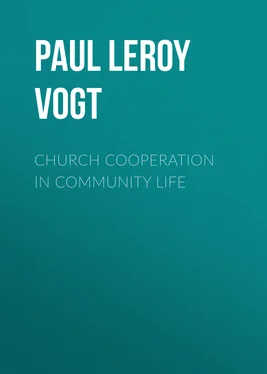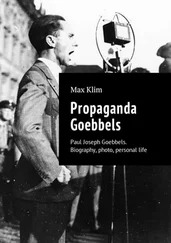Paul Vogt - Church Cooperation in Community Life
Здесь есть возможность читать онлайн «Paul Vogt - Church Cooperation in Community Life» — ознакомительный отрывок электронной книги совершенно бесплатно, а после прочтения отрывка купить полную версию. В некоторых случаях можно слушать аудио, скачать через торрент в формате fb2 и присутствует краткое содержание. Жанр: foreign_prose, foreign_religion, foreign_antique, на английском языке. Описание произведения, (предисловие) а так же отзывы посетителей доступны на портале библиотеки ЛибКат.
- Название:Church Cooperation in Community Life
- Автор:
- Жанр:
- Год:неизвестен
- ISBN:нет данных
- Рейтинг книги:4 / 5. Голосов: 1
-
Избранное:Добавить в избранное
- Отзывы:
-
Ваша оценка:
- 80
- 1
- 2
- 3
- 4
- 5
Church Cooperation in Community Life: краткое содержание, описание и аннотация
Предлагаем к чтению аннотацию, описание, краткое содержание или предисловие (зависит от того, что написал сам автор книги «Church Cooperation in Community Life»). Если вы не нашли необходимую информацию о книге — напишите в комментариях, мы постараемся отыскать её.
Church Cooperation in Community Life — читать онлайн ознакомительный отрывок
Ниже представлен текст книги, разбитый по страницам. Система сохранения места последней прочитанной страницы, позволяет с удобством читать онлайн бесплатно книгу «Church Cooperation in Community Life», без необходимости каждый раз заново искать на чём Вы остановились. Поставьте закладку, и сможете в любой момент перейти на страницу, на которой закончили чтение.
Интервал:
Закладка:
While the proportion of the total population belonging to church increased from 38.1 per cent in 1906 as compared with the 1910 population to 39.6 per cent in 1916 as compared with the 1920 population, the magnitude of the unfinished task is still almost staggering. If the proportion for rural America were the same as for the country as a whole, there would be 20,143,292 people not belonging to church. Church membership, of course, is not the only criterion of the influence of the church; nor would all denominations admit that all the people should belong to church, since some would not accept children not yet having reached the age of accountability. But in any case Christian America is not Christian even in church membership. This does not take into account matters of social and economic relationships which the spirit of Christianity has not yet penetrated and by which church members as well as nonmembers are bound.
More than 50,000,000 rural folk rising to a consciousness of their inherent solidarity and community of interest, and more than 20,000,000 of these not affiliated with any religious organization, present a challenge for trained leadership unequaled in the history of the world. Urban interests have grown powerful. Urban life has rapidly advanced for at least the more favored groups until it has far outstripped conditions in rural communities that go to make up the best in modern civilization and culture. Germs have been found in the "Old Oaken Bucket" in the country, while the scourge of typhoid has been banished from the city, and the "Church in the Dell" has crumbled in decay, while the metropolitan pulpit has taken the best leadership for its own. The country has been unable to compete with the urban centers for educational, religious, or social leadership because wealth has accumulated in the cities. Rural population has declined because the prizes in wealth accumulation were in the cities and because it was easier to secure those things there that people have learned to value as most worth while, in good housing, medical attendance, education, and recreation. While city poets have sung the praises of country life, many people who have lived in the country and endured the long hours and little pay from husbandry have, like the Arab, folded their tents and slipped away; and when once they have tasted the advantages of urban life, have not returned.
No civilization can be wholesome or permanent so long as any one great group is permanently handicapped in its struggle for economic or social welfare. So long as any group is evidently at a disadvantage the shift of population from the less-favored to the better-favored groups will continue; that is, unless castes are formed which compel people to remain permanently in one group or the other. And this does not happen in modern democratic society. And so long as there is a continuous shift of population in one direction or another we have evidence that conditions are such as to induce the shift.
It is the existence of conditions such as these that makes the challenge for a trained loyal service on the part of those selected to attend to matters concerned with rural public welfare.
It is the purpose of the following pages to outline briefly some of the conditions to which the church must give attention if it is to meet the demand now made upon it by modern rural life. It is not intended to be a treatise on practical theology in the sense ordinarily accepted in courses on that subject. Very little attention will be given to matters of organization or administration of the local church. It is believed that if only ministers of the gospel can once attain an adequate grasp of the purposes of religious service, the matter of method of accomplishing results may be left largely to the pastors themselves. On the other hand, emphasis upon method, which seems to be demanded by many ministers instead of knowledge of ends to be attained, is more than likely to lead to overorganization, or organization not adapted to objectives. One of the essentials in all leadership is that of having definite objectives toward which to work, and it is the purpose of this text to call the attention to objectives and to organization, both local and general, adapted to the attainment of objectives rather than the methods of attaining them.
CHAPTER II
THE BASIS FOR COMMUNITY SERVICE
The past few years have witnessed a marked widening of the concept of the functioning of the church. But there is still considerable question concerning the basis for the program of church work that now bids fair to become conventional. Not long ago the writer attended a convention of a state social welfare association. Over three hundred and fifty persons were in attendance representing the leading agencies for the advance of social welfare in the entire commonwealth, both urban and rural. Careful inquiry revealed the fact that but one minister had registered, and he was on the program. On the other hand, it is the rare occurrence for those professionally interested in social service to be present at a convention of representatives of religious orders. In practice there is still a clean-cut dividing line between those interested in social progress and those engaged in so-called religious work. The social workers are not irreligious; many of them believe their service to be of the highest type of religious expression. The representatives of the church are welcomed by social workers into their councils, but it is feared that often these representatives are not taken seriously because for so long they have had a program that affected social welfare in but an indirect way. The time has come when representatives of the church should accept their rightful position as leaders in all movements that tend to make human existence more Christ-like and to make the kingdom of heaven on earth more of a reality.
The reason for the attitude of both ministers and people toward the church has been the emphasis placed upon individual regeneration as the sole and all-important method of advancing the Kingdom. The "conversion" of the individual would lead him into right conduct. When all individuals were converted then the kingdom of heaven would indeed be at hand.
But the advance of social science has made clear the fact that the individual is very largely the expression of the group in which he lives. Custom, convention, fashion, public opinion, and other group influences go far to determine what individual thought and action will be in any given group. The Tennessee mountaineer has a different standard of what constitutes true religion from that of the New England Unitarian. The code of race relationships in Mississippi is not the same as that in Wisconsin. The standards of the boy's "gang" determine largely the dress, the ideals, and habits not only of youth but of the coming man. Even in the life of the individual different standards exist suitable to the several groups in which he carries on his habitual activities. The capitalist who corrupts Legislatures with impunity in business or who prevents child-labor legislation may be a model Christian gentleman in his home and church life.
It is admitted that in the last analysis the group mind can have its existence only in the individual minds that compose it. But it is also true that when we consider the minds of individuals working in groups with the consciousness of what the reactions of others are, the results are different from what they are when the individual acts alone. Moreover, individuals as a class react in much the same way to stimuli that affect all of the members of the group at a given time. If the price of milk is raised so that there is suspicion of profiteering, common resentment appears. If the leadership of a political party is threatened, the politician, even though he loses leadership, rarely bolts his group. Instead he finds some excuse for standing by the party organization. It is not necessary to alter the minds of all individuals by "conversion" in the conventional manner either to change public opinion, alter physical conditions, or change the form of social organization. When these changes are effected in the minds of the controlling elements of the group, then the entire public mind and social organization are altered and the social process goes on stimulated in newer and, it is hoped, better directions.
Читать дальшеИнтервал:
Закладка:
Похожие книги на «Church Cooperation in Community Life»
Представляем Вашему вниманию похожие книги на «Church Cooperation in Community Life» списком для выбора. Мы отобрали схожую по названию и смыслу литературу в надежде предоставить читателям больше вариантов отыскать новые, интересные, ещё непрочитанные произведения.
Обсуждение, отзывы о книге «Church Cooperation in Community Life» и просто собственные мнения читателей. Оставьте ваши комментарии, напишите, что Вы думаете о произведении, его смысле или главных героях. Укажите что конкретно понравилось, а что нет, и почему Вы так считаете.












